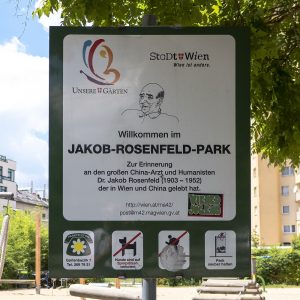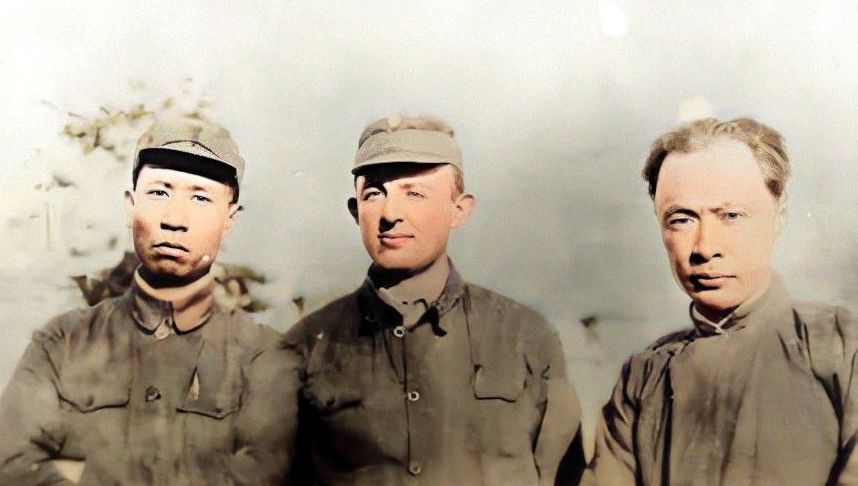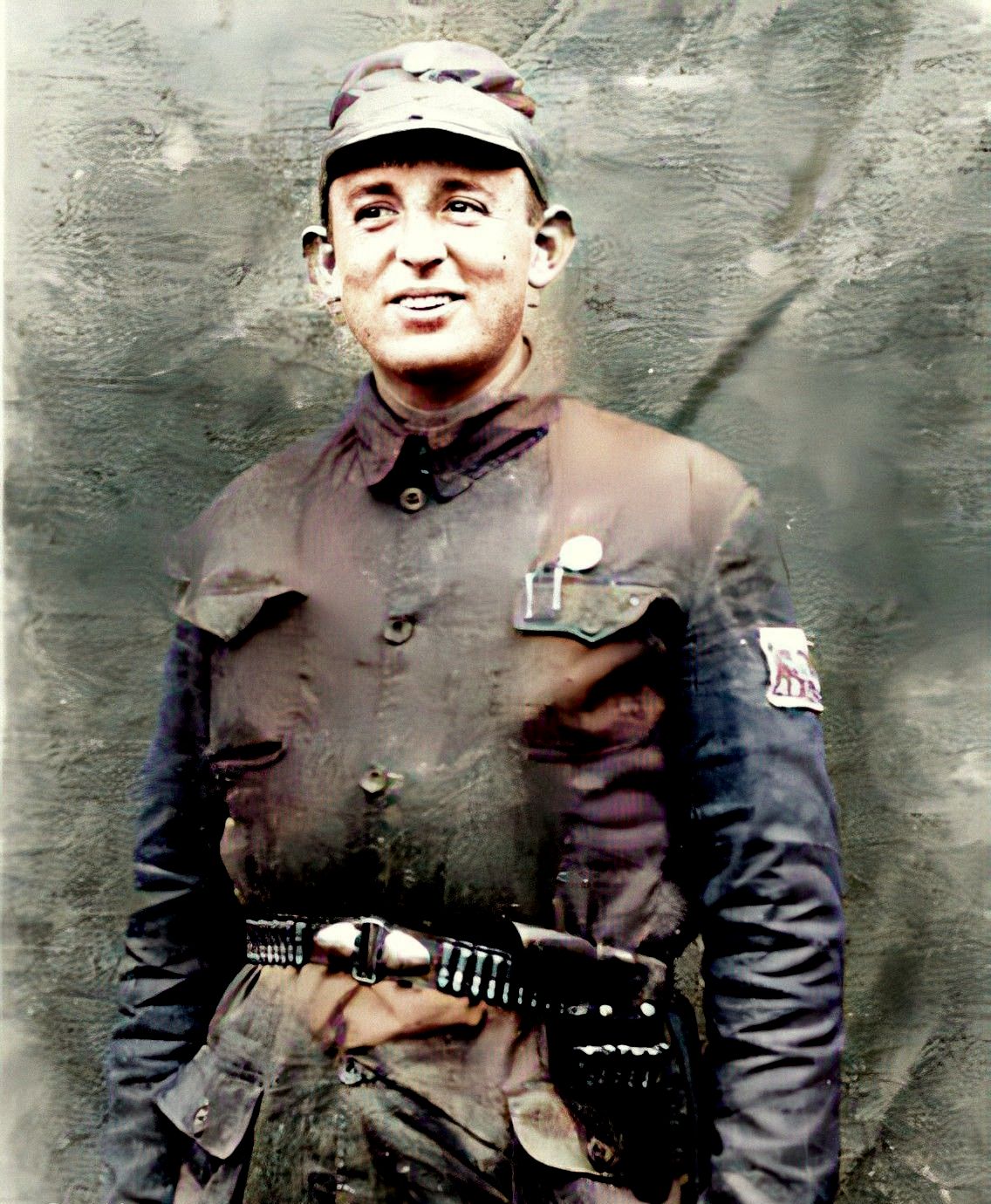In any other context, if a Jew were nicknamed ‘big nose’ it would be considered a racial slur. But Luo Shengte (Chinese for big nose) was the nickname given to Dr. Jakob Rosenfeld, a Jewish Austrian physician who volunteered for the People’s Liberation Army in China in the 1940’s. In no way was it intended to be derogatory – on the contrary. The Chinese Communists loved Rosenfeld like a brother and continue to venerate him and treasure his memory. To this very day, the late Jewish doctor is a symbol of the friendship between China and Israel, as well as the friendship between China and Austria.
It is unlikely that parents who come to push their children on the swings in the playground at Jakob Rosenfeld Park in Vienna, Austria’s capital city, know much about the life of the man who the park is named after. The sign installed there does say that he was a great physician and humanist, who lived in Vienna and in China. But based on the sign alone, it is hard to imagine the exciting adventure that made up Rosenfeld’s fascinating life story.

When he was born at the beginning of the 20th century to a Jewish family in Lemberg in the Austro-Hungarian Empire (now the Ukrainian city of Lviv), it would have been difficult to predict where his life would take him. From Lemberg, Rosenfeld’s family moved to Wöllersdorf in Austria, where Jakob grew up. After finishing school, he went to Vienna to study medicine and worked at a hospital in the city. But in 1934 he was arrested for being a member of the Social Democratic Party. Upon his release, he opened a private clinic. However, following the Anschluss, he was sent to Dachau, and from there to Buchenwald. Unlike many others, it was not Rosenfeld’s fate to end his life in the camp. Rather, he was destined to reach distant places and fight on foreign soil. He had the fortune of being one of the thousands of Jews who managed to be rescued thanks to the visas to Shanghai that were issued to them by the Consul-General of the Chinese Republic in Vienna, Ho Fengshan. Owing to those visas, years later the Consul-General was posthumously awarded the title of Righteous Among the Nations.
Shanghai, which was a huge metropolis where foreign superpowers were granted special status on Chinese soil, became a haven for Jewish refugees fleeing from the Nazis, at a time when most countries in the world were closing their gates to them. The Hongkew district, which was part of the International Settlement of the city, was managed by the Shanghai Municipal Council. It became a Jewish ghetto, where around 20,000 refugees lived in crowded and impoverished conditions.
Rosenfeld arrived in China with one of his brothers, but did not integrate into the Jewish community in the city. His political leanings led him to seek out the local Communists, as did a small group of other Jews. The latter included the reporter, Hans Shippe, who greatly influenced Rosenfeld’s views, and the Jewish-Austrian physician, Richard Frey, who had experiences similar to those of Rosenfeld. The Chinese Foreign Ministry website, which provides added proof of the country’s great respect for Rosenfeld, posted an article that quotes him as saying that he did not come to China to lead a comfortable life, but that he came to join the revolution. And he did in fact do that.

Initially, he opened a urology and gynecology clinic in Shanghai’s French Quarter. However, in 1941 he volunteered for the People’s Liberation Army, which was engaged in the Second Sino-Japanese War and was part of the national military forces fighting against the Japanese Empire. Rosenfeld served as a physician and essentially performed every needed medical procedure: he operated on wounded soldiers, treated civilians in the villages, and delivered babies. The roles he filled in the army became increasingly important – he opened hospitals, established a medical school that trained doctors and medical teams, and in effect was in charge of all the health and medical matters of the People’s Liberation Army of China. The entire time, Rosenfeld never lost sight of his objective: to save as many lives as possible. The lives of the villagers were no less important to him than the lives of the soldiers, and he did the utmost to treat them as well. According to estimates, between 1941 and 1949, Rosenfeld saved the lives of tens of thousands of Chinese.
Rosenfeld rose through the ranks, receiving promotion after promotion. The European physician even received the rank of general from Mao Zedong – a honor never bestowed on a foreigner in China. The end of the Second Sino-Japanese War in September 1945 did not mean that Rosenfeld’s job was over. The conclusion of that war also marked the end of the truce between the Communists and the Nationalists (Kuomintang) – a truce which had been made in order to present a united front against their common enemy, the Japanese. China found itself embroiled in a civil war, during which Rosenfeld continued to work for the Communists.

The Chinese Communists considered Rosenfeld one of their own. He was close to the highest-ranking officials in the party, including Liu Shaoqi, who would later become the President of the People’s Republic of China after Mao Zedong’s death, and to Mao himself. He also forged a deep friendship with the Communist commander, Chen Yi, who would later go on to become the Mayor of Shanghai and Foreign Minister of China. The two shared a love of literature and poetry, took hikes together, and had long conversations in French. Chen Yi also wrote poetry, and an anthology of his writings includes a “Letter to Comrade Rosenfeld,” in which Chen Yi supports the decision made by his friend, the European doctor, to join the struggle of the People’s Army of China.
Rosenfeld believed that the Communist Party would free the Chinese people from both the Japanese invaders and the Kuomintang. In 1942, he became a member of the Chinese Communist Party, and he is still considered a national hero in China.
At the end of 1949, after the People’s Republic of China was founded, Rosenfeld decided to return to Vienna. His Chinese friends advised him to remain in China, claiming that Europe no longer had a place for him. But Rosenfeld wanted look for relatives who had survived the Holocaust. At a farewell dinner held for him before going back to Austria, Chen Yi spoke about his friend’s huge contribution to the revolution and awarded him a badge of merit.

After a short time in Austria, Rosenfeld tried unsuccessfully to return to China. He also tried to emigrate to the United States, but was denied a visa due to his ties with Communist China. In 1951, he moved to Israel, settled in Tel Aviv, and worked at Assuta Hospital. It appears that he was actually waiting for a visa to return to China, but within less than a year he died of a heart attack at the age of only 49.
After Israel and China established diplomatic relations in 1993, diplomatic guests who would come to Israel made a point of visiting Rosenfeld’s grave at Kiryat Shaul Cemetery. In 1999, an exhibition was dedicated to him at Beit Hatfutsot (now called ANU – Museum of the Jewish People), and about twenty years ago Rosenfeld’s diary from the years he spent in China was published in Austria – named I Knew Them All. He has not been forgotten in China and the admiration for him has lasted for years – there are streets and a hospital named after him, there are stamps with his image on them, and there is a sculpture that commemorates him, which portrays Rosenfeld as the ‘big nose’ friend of the Chinese.